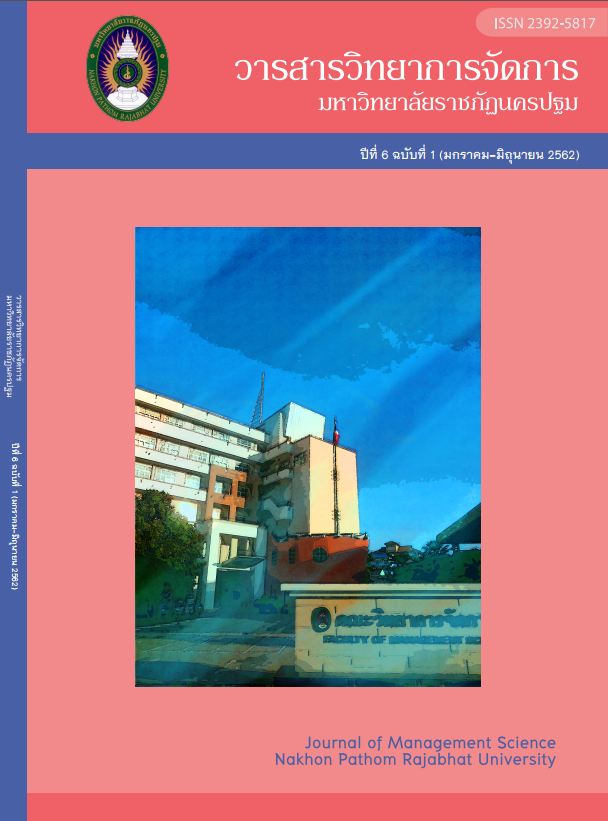Transition Conditions of Consumption Behavior influencing the Sustainable Consumption Patterns in Thailand.
Main Article Content
Abstract
This research aims to (1) analyze confirmatory factor of transition conditions of consumption behavior and sustainable consumption patterns in Thailand (2) find out the structural equation model: transition conditions of consumption behavior influencing the sustainable consumption patterns in Thailand. This research was the survey research testing 400 respondents in Bangkok Metropolis and Vicinities, Chiang Mai Province, Khon Kaen Province, Rayong Province and Phuket Province. The research samples were obtained from Quota sampling. The data were collected by questionnaire. In this study, confirmatory factor analysis (CFA) and structural equation modeling (SEM) were used to test hypotheses.
According to the analysis, transition conditions of consumption behavior consist of 2 factors of the latent variable that were facilitator and inhibitor which had positive on sustainable consumption patterns with path coefficient 0.58 and 0.64 respectively. The factor loading of variables on facilitator were found in descending order as follows: 1) environmental awareness (EA) (0.85) 2) sustainability knowledge/information (KI) (0.73) and 3) educational level (EL) (0.67). The factor loading of variables on inhibitor were found in descending order as follows: 1) role of social and community empowerment (SC) (0.82) 2) value perception (VP) (0.81) and 3) government policies on enhanced interactions (GP) (0.79). The factor loading of variables on sustainable consumption pattern in descending order as follows: 1) purchasing decision (PD) (0.72) 2) recycle behavior (RB) (0.66) 3) waste management (WM) (0.64) and 4) renewable energy (RE) (0.59).
Article history : Received 20 April 2019
Revised 31 May 2019
Accepted 03 June 2019
SIMILARITY INDEX = 0.00
Article Details
The views and opinions of the article appearing in this journal are those of the author. It is not considered a view and responsibility of the editorial staff.
References
จุฑาทิพย์ คล้ายทับทิม. (2553). การเมืองเรื่องสิ่งแวดล้อม. กรุงเทพฯ : โรงพิมพ์ชุมชนสหกรณ์การเกษตรแห่งประเทศไทย จำกัด.
ปวีณา คำพุกกะ. (2556). วิจัยธุรกิจ. อุบลราชธานี : โรงพิมพ์มหาวิทยาลัยอุบลราชธานี.
เผด็จ จินดา. (2553). ระบบ สารสนเทศชุมชนเพื่อการพัฒนาอย่างยั่งยืน. วารสารสารสนเทศศาสตร์, 28 (1), 93-106.
สำนักงานคณะกรรมการการพัฒนาการเศรษฐกิจและสังคมแห่งชาติ. (2561). ผลิตภัณฑ์ภาคและจังหวัด แบบปริมาณลูกโซ่ ฉบับ พ.ศ. 2559. [ออนไลน์] ค้นเมื่อ 19 สิงหาคม 2561. จาก www.nesdb.go.th/ewt_dl_link.php?nid=5628&filename=gross_regional
สำนักงานนโยบายและแผนทรัพยากรธรรมชาติและสิ่งแวดล้อม. (2560). แผนขับเคลื่อนการผลิตและการ บริโภคที่ยั่งยืน พ.ศ. 2560-2579. [ออนไลน์] ค้นเมื่อ 12 สิงหาคม 2561. จาก https://www.onep.go.th /topics/37502
สำนักงานสภาพัฒนาการเศรษฐกิจและสังคมแห่งชาติ. (2546). การพัฒนาที่ยั่งยืนในบริบทไทย. [ออนไลน์] ค้นเมื่อ 20 สิงหาคม 2561 จาก https://www.nesdb.go.th/download/article/article_20150813133735.pdf.
สำนักบริหารการทะเบียน กรมการปกครอง. (2561). ระบบสถิติทางการทะเบียน. [ออนไลน์] ค้นเมื่อ 10 กันยายน 2561 จาก https://stat.bora.dopa.go.th/stat/statnew/statTDD/
Armitage, C. J., & Conner, M. (2001). Efficacy of the theory of planned behavior: A meta-analytic review. British journal of social psychology, 40 (4), 471-499.
Bang, H. K., Ellinger, A. E., Hadjimarcou, J., & Traichal, P. A. (2000). Consumer concern, knowledge, belief, and attitude toward renewable energy : An application of the reasoned action theory. Psychology & Marketing, 17 (6), 449-468.
Birtwistle, G., & Moore, C. M. (2007). Fashion clothing–where does it all end up?. International Journal of Retail & Distribution Management, 35 (3), 210-216.
Duran, C. J. (2009). The role of personal values in fair trade consumption. Journal of Business Ethics, 84 (4), 549-563.
Gardner, G. T., & Stern, P. C. (2002). Environmental problems and human behavior, MA : Pearson.
Magnusson, M. K., Arvola, A., Hursti, U. K. K., Åberg, L., &Sjödén, P. O. (2003). Choice of organic foods is related to perceived consequences for human health and to environmentally friendly behaviour. Appetite, 40 (2), 109-117.
Meleis, A. I., Sawyer, L. M., Im, E. O., Messias, D. K. H., & Schumacher, K. (2000). Experiencing transitions : an emerging middle-range theory. Advances in nursing science, 23 (1), 12-28.
Morgan, L. R., & Birtwistle, G. (2009). An investigation of young fashion consumers' disposal habits. International journal of consumer studies, 33 (2), 190-198.
Ölander, F &ThØgersen, J. (1995). Understanding of consumer behaviour as a prerequisitefor environmental protection. Journal of consumer policy, 18 (4), 345-385.
Shaw, D., Hogg, G., Wilson, E., Shiu, E., & Hassan, L. (2006). Fashion victim : the impact of fair trade concerns on clothing choice. Journal of Strategic Marketing, 14 (4), 427-440.
Staats, H. (2003). Understanding Pro-environmental Attitudes and Behavior. An Analysis and Review of Research Based on the Theory of Planned Behavior. Psychological theories for environmental issues, Aldershot, England : Ashgate.
Stern, P. C. (2000). New environmental theories: toward a coherent theory of environmentally significant behavior. Journal of social issues, 56 (3), 407-424.
Straughan, R. D., & Roberts, J. A. (1999). Environmental segmentation alternatives : a look at green consumer behavior in the new millennium. Journal of consumer marketing, 16 (6), 558-575.
Ukenna, S., Nkamnebe, A. D., Nwaizugbo, I. C., Moguluwa, S. C., & Olise, M. C. (2012). Profiling the environmental sustainability-conscious (ESC) consumer: Proposing the SPP model. J. Manag. Sustain. 2012, 2, 197-210.
Vlek, C., & Steg, L. (2007). Human Behavior and Environmental Sustainability: Problems, Driving Forces and Research Topics. Journal of social issues, 63 (1), 1-19.
Young, W., Hwang, K., McDonald, S., & Oates, C. J. (2010). Sustainable consumption: green consumer behaviour when purchasing products. Sustainable development, 18(1), 20-31.


